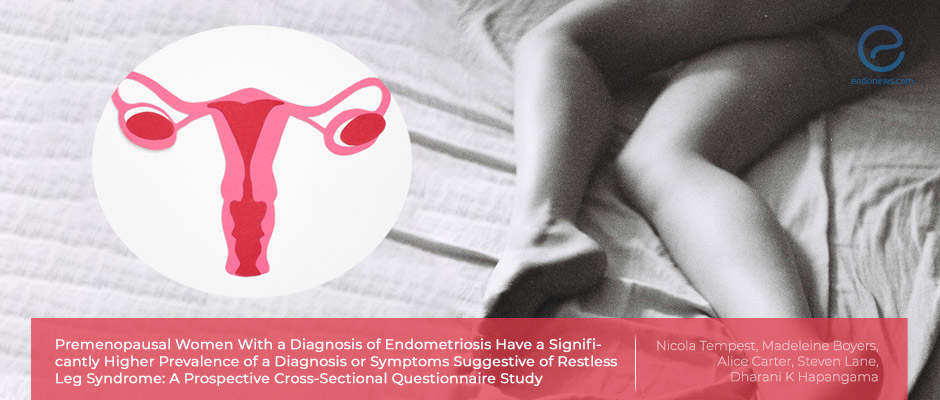Could There Be a Relationship Between Endometriosis and the "Restless Leg Syndrome"?
Jun 4, 2021
The answer seems to be yes according to a new study by researchers in the U.K.
Key Points
Highlights:
- There seems to be a link between endometriosis and the "restless leg syndrome".
Importance:
- Clinicians should be aware of the association and check for symptoms of restless leg syndrome in patients diagnosed with endometriosis to improve their quality of life.
What's done here:
- Researchers conducted a prospective, cross-sectional, observational self-completed questionnaire study to uncover the potential link between endometriosis and the "restless leg syndrome".
Key results:
- Women who reported a prior surgical diagnosis of endometriosis had a greater risk of having symptoms of "restless leg syndrome" or a prior formal diagnosis of the condition.
- Women with a surgical diagnosis of endometriosis and those with symptoms of the disease also had a higher risk of having symptoms or a formal diagnosis of restless leg syndrome.
- There was a modest positive correlation between the cumulative endometriosis-associated symptom scores and the restless leg syndrome severity scores.
Limitations:
- Researchers did not verify the answers of the women who completed the questionnaire against hospital records.
- The British Society for Gynecological Endoscopy pelvic pain questionnaire is not validated for use on a continuous scale.
- All five essential diagnostic criteria according to the international restless leg syndrome study group were not included in the questionnaire.
- There could be a subjective symptom exaggeration reflected in women’s answers to the questionnaire.
- The findings have to be confirmed in a larger cohort of patients.
Lay Summary
Women with endometriosis have a significantly higher prevalence of restless leg syndrome according to a study published in the scientific journal "Frontiers in Endocrinology". This is the first study highlighting such an association between the two conditions.
These findings are important because they can pave the way to the discovery of new therapies that could address both conditions and improve patients’ quality of life.
Restless legs syndrome is characterized by an uncontrollable urge to move the legs especially in the evening or at night. The cause of the condition is not known but researchers think that there may be a genetic component to it. Pregnancy and hormonal changes may also temporarily worsen the symptoms of restless leg syndrome. Other risk factors include peripheral neuropathy and spinal cord conditions such as lesions.
In order to elucidate the possible link between restless leg syndrome and endometriosis, a team of researchers led by Dr. Dharani K. Hapangama conducted a prospective, cross-sectional, observational study. The researchers distributed a questionnaire to 650 pre-menopausal women at Liverpool Women’s Hospital over a four-month period, of which 465 were included in the final analysis.
The results of the questionnaire showed that women who said they had a surgical diagnosis of endometriosis had a greater risk of also having symptoms of restless leg syndrome and a formal diagnosis of the condition.
Even if they had not received a surgical diagnosis of endometriosis, women with symptoms suggestive of endometriosis, had a significantly higher risk of having symptoms or having been diagnosed with restless leg syndrome.
The endometriosis-associated symptom scores were correlated with the severity of restless leg syndrome.
“This (…) study builds on the current understanding of endometriosis and suggests that there is a link between symptoms of endometriosis and [restless leg syndrome]”, the researchers wrote. They added that more research is needed to confirm or refute these findings.
Research Source: https://pubmed.ncbi.nlm.nih.gov/33854478/
restless leg syndrome symptoms of endometriosis quality of life

